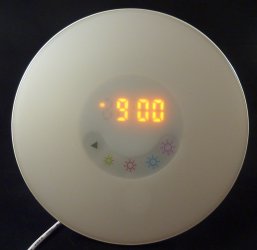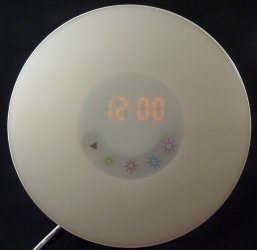




















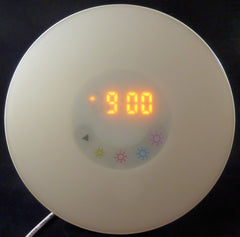
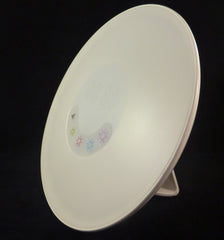
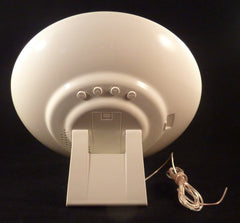
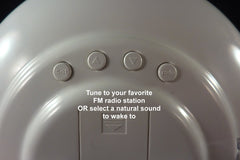

















Sunrise Clock
- $59.95 USD
$89.95 USD- $59.95 USD
- Unit price
- per
Wake Healthier and Vibrant through the Sunrise Clock
There is a biological basis for hating the sudden shock of your alarm waking you from a deep sleep. This is usually as a result of experiencing sleep inertia, and it can leave you feeling groggy for some hours after you wake. Through the use of a Sunrise Clock, you are able to slowly wake, the way nature intended you to wake, making you prepared and fresh for a good day ahead.
What is Sleep Inertia?
The majority of people who use a regular alarm clock often experience trouble waking up in the morning. Sleep Inertia often appears as the feeling of incomplete awakening and grogginess that reduces your ability to perform even simple tasks. Part of your body is actually still in a sleep state.
Sleep inertia typically lasts 15-30 minutes, but can last as long as 4 hours. During this period, you are at a reduced level of capacity and may have trouble doing the simplest of everyday actions. In order to get rid of this state, most people rely on caffeine from their morning coffee or adrenaline from using loud alarm clocks.
Sleep inertia is the result of sudden awakening during REM sleep. When you wake up during REM, you still have high levels of melatonin, causing sleepiness. The longer you sleep, the higher level of melatonin is observed during REM stage. When you wake up during non-REM sleep, your blood pressure, heart rate and brain activity are slowed down, helping you feel awake and alert much quicker.
Chances are that you have Sleep Inertia
If you use regular alarm clock, your chances of sleep inertia can be as high as 89%.
Fixed-time alarm clocks wake you up the time you set it to, so it has no way of knowing what stage of sleep your body is in. It simply does what it can, and concerning the right moment for awakening, it just plays roulette. It’s hard to predict in which sleep stage you will be at 7AM the next morning.
Statistically speaking, there is a 45% chance that a fixed-time alarm clock will wake you up from REM sleep, and a 49% chance from non-REM sleep. These are your approximate chances to have sleep inertia. And there is only a 9% chance to be awakened around the optimal moment of sleep stage transition. You can play this roulette all your life and suffer from morning grogginess in the majority of cases.
Sleep inertia is dangerous
If you are awoken suddenly, the effects of sleep inertia can last from 30 minutes to 4 hours. During this period, you are most likely to make mistakes doing even well known routine actions. Sleep inertia has a wide range of unpleasant and definitely dangerous effects, affecting you and others:
- Large amounts of caffeine affecting your heart
- High adrenaline levels caused by loud alarm clock
- Wake-up stress
- Reduction in memory ability
- Drowsy driving
- Being late for work
- Lower productivity in the first part of the day
- Low performance and response time on tasks, loss of concentration
- Impairment of the capability to make decisions
- Some of these effects may be especially dangerous for bus drivers, pilots and other shift workers
Drowsy driving is estimated to cause about 20 percent of accidents. That is an estimated 1.2 million accidents a year, more than drugs and alcohol combined.
Many drowsy driving accidents occur early in the morning, not when the driver has been up too long, but when he or she has recently awoken and is still suffering from sleep inertia. Sleep inertia in a driver behind the wheel can be very risky as the impairment of motor and cognitive functions can affect a person’s ability to drive safely.
It is extremely important not to drive or operate machinery during any episode of sleep inertia. Your reaction time and level of concentration diminishes greatly during this time.
We actually sleep in 90 min Intervals!
When we sleep, we actually cycle through several levels of sleep - starting at a light sleep that gradually deepens, eventually hits bottom, then cycles back up again. Each cycle takes approximately 90 minutes (45 minutes to get into the deepest sleep, and 45 minutes to return to light sleep.)
If you wake up when you're in the deeper states, you're more likely to feel groggy, sleepy, and uncomfortable. Waking up in the lighter states (even with less actual sleep) is easier, and you're more likely to feel awake and energized. Think about sleep as of maintenance or recovery for your cells. Your body will be happier to leave you with 3 or 4 sleep stages completed rather than with 3 and a half.
The Solution - The Sunrise Clock
A clock such as the Sunrise Clock allows you to wake up gradually and eases those first few moments of sleep inertia. With a window of gradually brightening light over 30 min, we can naturally wake up when our bodies are ready (within the 90 min sleep interval described above). If the Sunrise clock is brightening over a 30 minute window, and you hit your shallowest sleep stage 10 minutes into that window - you'll wake up then, feeling good. (With a traditional alarm, you would begin going into a deeper sleep, only to be socked awake 20 minutes later by the alarm).
The Natures Energies Sunrise Clock
The Natures Energies Sunrise Clock provides a more pleasant and natural way to wake up in the morning. Because there's nothing worse than being jarred awake by a blaring alarm clock, the Natures Energies Sunrise Clock wakes you in a natural way with light that increases gradually. The Wake-Up Light simulates the sunrise to help you greet the morning with an improved mood and energy level. Light gradually increases for 30 minutes before your alarm time to gently prepare your body to wake up and feel more energetic at the start of your day. With optional FM radio and nature sounds, the Wake-Up Light ensures waking up will be a pleasant experience.
Digital time display (automatically dims at night time, brightens during the day)
|
Bright display by day |
Dim display by night (after 11pm) |
Sunrise simulation wakes your gradually over 30 min
The Sunrise Routine Described
30 minutes before the set time, the sunrise simulation white light will start from 1% of brightness to 100% of brightness at set time to prepare our body for waking up and getting alert. 10 minutes before the preset time, the preselected sound (natural sounds or FM radio) will play with 50% of preset volume for 1 minute.
At the set time, the preselected sound will play with 100% of volume for 10 minutes. Any time while the sound is playing, you can touch/press any key/button to stop the sound.
Watch the following simulation showing how the clock lightens the room over a 30 minute period (the video is less than a minute to watch but shows what happens over 30 minutes. Sound is not included);
Wake up to your choice of 6 natural sounds (e.g., running water) or FM radio. Snooze function included.
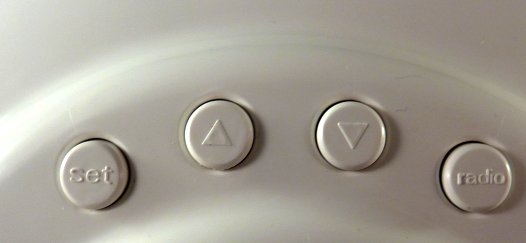
Has a white light with 4 brightness settings - use it as a bed side lamp
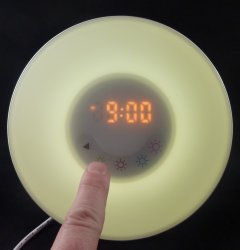 |
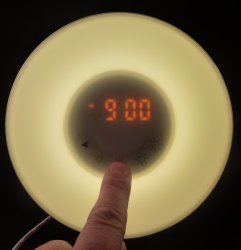 |
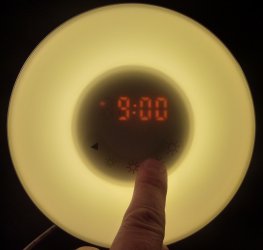 |
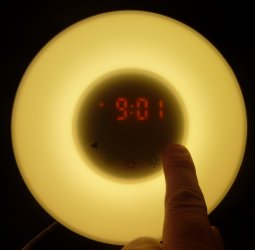 |
Mood Light
The Sunrise Clock Doubles as a Rainbow Mood Light. Watch the following video to see it work its way through all colors of the spectrum;
If you prefer a static color (non-changing), select from 1 of 4
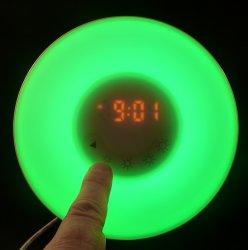 |
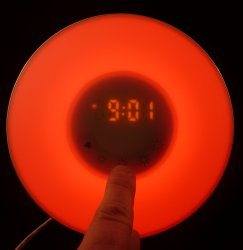 |
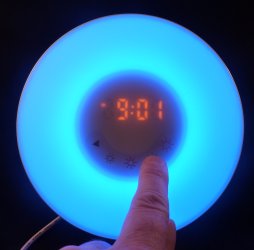 |
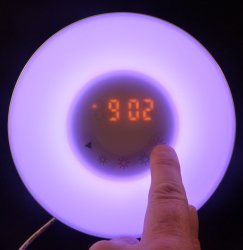 |
Operating Guide (Scanned)
See "Attachments" Tab at the top of the page (just below pictures).
Dimension: 170 x 40mm: Weight: 160g
Comes supplied with an electrical adaptor plug to convert to the electrical wall socket in your country.
Returns Policy
You may return most new, unopened items within 30 days of delivery for a full refund. We'll also pay the return shipping costs if the return is a result of our error (you received an incorrect or defective item, etc.).
You should expect to receive your refund within four weeks of giving your package to the return shipper, however, in many cases you will receive a refund more quickly. This time period includes the transit time for us to receive your return from the shipper (5 to 10 business days), the time it takes us to process your return once we receive it (3 to 5 business days), and the time it takes your bank to process our refund request (5 to 10 business days).
If you need to return an item, simply login to your account, view the order using the "Complete Orders" link under the My Account menu and click the Return Item(s) button. We'll notify you via e-mail of your refund once we've received and processed the returned item.
Shipping
We can ship to virtually any address in the world. Note that there are restrictions on some products, and some products cannot be shipped to international destinations.
When you place an order, we will estimate shipping and delivery dates for you based on the availability of your items and the shipping options you choose. Depending on the shipping provider you choose, shipping date estimates may appear on the shipping quotes page.
Please also note that the shipping rates for many items we sell are weight-based. The weight of any such item can be found on its detail page. To reflect the policies of the shipping companies we use, all weights will be rounded up to the next full pound.
Related Products
- Choosing a selection results in a full page refresh.


